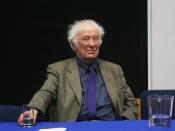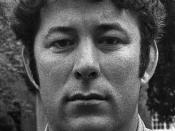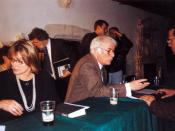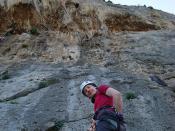Literature essay: Choose 2 poems, which you enjoy, and explain why you enjoy them, making close reference to the poems.
The two poems, which I enjoy immensely, are "Personal Helicon" and "The Poplar-field".
"Personal Helicon" by Seamus Heaney is basically about the poet's creative process described through the use of uncommon and unique imagery: exploring of wells. The title itself means "my own source of inspiration" as "Helicon", in Greek mythology, refers to the mountain where the Muses, goddesses of all artistic inspiration, live.
In each of the first four stanzas, different facets of the poet's fascination with wells are shown. His description of the wells is purely for the readers to share in his enjoyment of wells. He also intends for the readers to appreciate it through his usage of rich, passionate and sensuous imagery that appeals to all our senses, giving the readers a sense of personally being there smelling, touching and seeing the wells.
In the first stanza, the overwhelming allure that draws him to wells is being described, "As a child they could not keep me from wells"æ and windlasses." The mystery of wells attracts him and wells are described as mysterious with its "dark drop, the trapped sky, the smells".
In the second stanza, he focuses on one well and vividly describes it as being" in a brickyard" covered "with a rotted board top." He describes the depth of the well by using the imagery of eating, "savoured the rich crash when a bucket plummeted down" and describes the well as being so deep that no light reaches it, "saw no reflection in it". He also suggests the idea of the well being full of possibilities through his choice of words, "rich" and "crash" (rich sound instead of a thud).
In stanza three, he describes the well, "a shallow one under a dry stone ditch" as being abundant with mosses and other pondweeds, "fructified like any aquarium". This again creates an image of wells having infinite possibilities. However the last line, "A white face hovered over the bottom" suggests that the poet's own reflection is unrecognizable even to himself. The poet is perhaps providing an insight that his true self has been disguised because of circumstances.
The whole description of the wells in the three stanzas collectively suggests that by looking into wells: dark, covered and deep, it is similar to exploring our dark, unknown side and the part of us that is hidden from the world. Only through self-exploration, will we have a better understanding of ourselves.
The fourth stanza has philosophical connotations. "Others had echoes, gave back your own call with a clean new music in it" suggests that one can gather new perceptive by daring to explore the unknown. It is also revealed that his childhood fascination with wells paved the way for him to become a poet as the idea of sound started when he was exploring wells, "echoes".
However in the last stanza, the poet takes on a more nostalgic and reflective tone. He uses the imagery of "big-eyed Narcissus" in which Narcissus is a Greek mythological figure who loves himself above all else to suggest that as a child, one can afford to be more preoccupied with themselves, self-absorbed and do as they please, without any pressure from society. Heaney also reveals that he misses his childhood where he had the ability to go forth and explore the mysterious, which is considered unacceptable behaviour in society as an adult, "beneath all adult dignity". Therefore, poetry has come to serve as another outlet for his exploration of the unknown, "I rhyme to see myself, to set the darkness echoing". This revelation explains his fascination with the wells as an inner motivation for his creative process as a poet and that poetry was, from a young age for him, a manifestation of his self-exploration to better understand himself through his perception of the surroundings and situations.
The poem focuses on Heaney's personal viewpoint of himself as a poet, his source of inspiration and why he is a poet. Heaney perceives himself very seriously as a poet and he is very much aware of his creative process. He understands himself very well. He knows that his character shapes his creative process and his creative pursuit stems from his creativity from child's play: exploring wells. There is a gradual change in the solemnity in the tone of the poem to better facilitate the drawing of a parallel between Heaney's childhood and adulthood as a poet and it is also for the readers to better stomach the themes, creative process, self exploration and different perspectives.
Similarly, "The Poplar-Field" by William Cowper has a serious theme, which the poem concludes with. It engages the same general structure of recounting the past and concluding on a philosophical and reflective tone as with "Personal Helicon". It is basically about the poet reminiscing over the felled poplars (type of trees); and his love for nature and what has become of it, which set him thinking about his own mortality and life and death through the use of a more conventional imagery of learning lessons from nature.
In the first stanza, now that "the poplars are fell'd", Cowper recounts the changes that has taken place and things he will miss. Without the "cool colonnade", trees growing in huge columns in a whole row; there would be none of the usual shade provided anymore, "farewell to the shade". There would no longer be the rustling of the leaves, "whispering sound" and "winds play no longer, and sing in the leaves", to sooth and calm the soul. Neither would the trees' image be reflected in the river, "Ouse".
In the second stanza, he recalls the first time, "Twelve years have elaps'd since I first took a view" that he went to "his favourite field and the bank where they grew". Yet, now all that he sees are the trunks of these poplars "now in the grass behold they are laid" and he settles down on a tree trunk which he describes as "the tree is my seat that once lent me a shade". This stark contrast between his memory and reality that the poet has described plainly, effectively paints a sad scenario.
In the third stanza, the poet continues to describe the drastic change his favourite field has undergone. Now that the trees are no longer physically standing there, even the "blackbirds has fled to another retreat" and he can no longer hear their "sweet-flowing ditty no more". This imagery suggests that things come to pass, as others will, in time, replace the things that are gone.
In the fourth stanza, Cowper compares his life to be like "fugitive years" which are "hasting away". This imagery suggests that in reality, people are always running away from death, which at the end of the day is inevitable and for himself death is slowly creeping up to him. He anticipates his death to come before a new group of trees will be able to grow, "ere another such"æ in its stead". Then, he will be just like the felled poplars, "long lie lowly as they" in his grave, "a turf on my breast, and a stone at my head".
In the last stanza, the poet reveals that the fallen trunks has set him thinking, " tis a sight to engage me" and "muse on the perishing pleasures of man". He believes that whatever pleasures we get in life, they will not last long. He compares "life be a dream", as we must wake up and face reality, just as we all eventually do awake from a dream. He also compares the pleasures in life with human life itself and the pleasures are even more short lived, "his enjoyments, I see, have a being less durable even than he".
The first three stanzas are shrouded in a sense of loss, mourning and nostalgia whereas the tone of the last two stanzas is philosophical and reflective. The poem is structured in this manner so as to accommodate the transition from a sense of sadness and longing to a sense of acceptance of the human condition. Life is transient, as death is inevitable and the pleasures in life at some point must be given up and are even more short-lived, such is the reality of all life forms. Therefore, we must cherish every moment of our lives.
In conclusion, the main reasons behind my taking to these two poems are that they are both introspective poems by nature and the sombre themes of having different perspectives and the transience of life, which they dealt with, intrigued me and I identified with them. Reading them made me ponder and reflect and they proved to have a therapeutic effect over me. The style and language in which they were presented is plain and simple. Yet, they are effective in conveying the message across to its reader. Most importantly, in both poems, nature or the surrounding evokes emotions in the poet. I can identify with these feelings as I strongly believe that human are closely linked with nature, both physically and mentally. Their influence over me is overwhelming. The poems have provided some soul food for my being and insights to my own character through my interpretation of them. Therefore, the sense of enjoyment that I derive from the above two poems is strong and a sense of attachment has grown between my soul and them.




